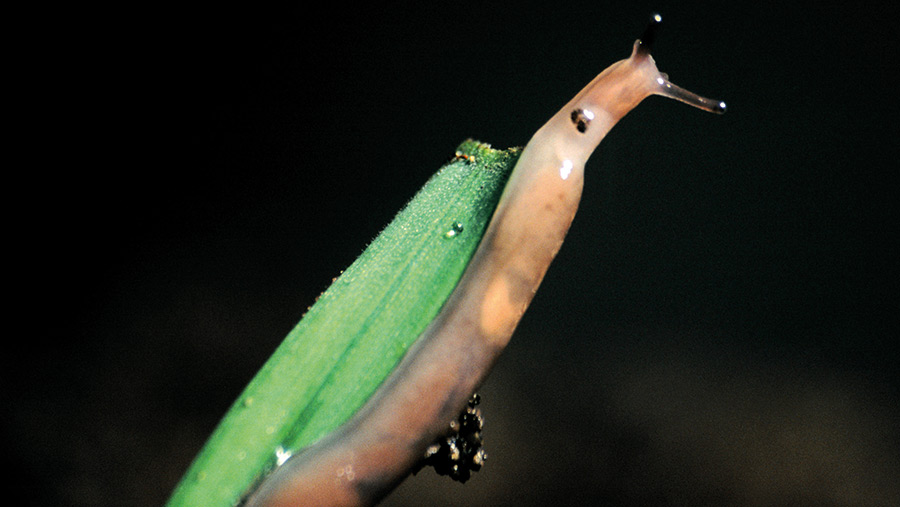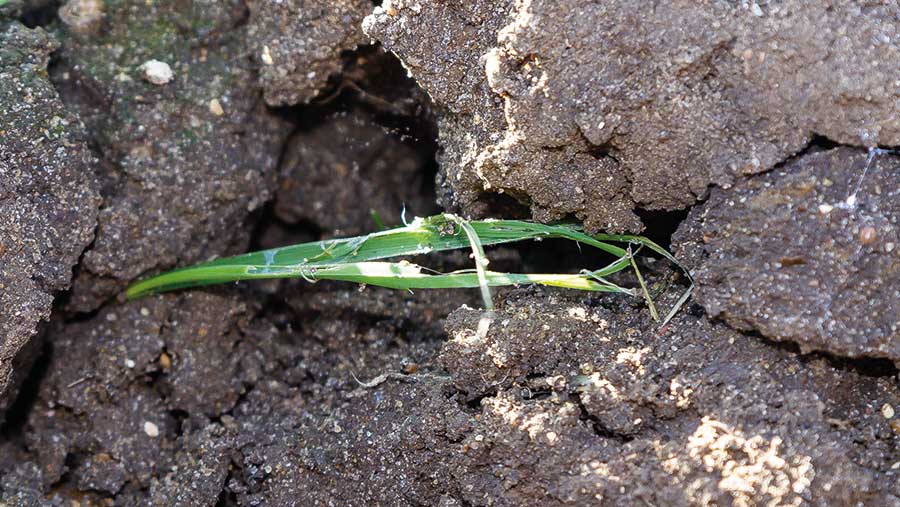Study suggests silicon spray reduces cereal slug damage
 © Blackthorn Arable
© Blackthorn Arable Growers concerned about slug damage in cereals this season could benefit from incorporating silicon into traditional fungicide spray timings.
Populations of the slimy pests have thrived in the wet autumn weather.
Silicon plays a vital role in plant development by strengthening crops and reducing the risk of pest and disease attack.
The element enhances plant resilience, stimulates defences and strengthens leaf cuticles from pest attack.
That’s why an early post-emergence application to cereals can enhance the physical leaf barrier of crops to deter populations of slugs, in what is the first high-pressure slug season since the loss of metaldehyde.
Silicon accumulation also translocates to the grain, revealing further benefits to subsequent cereal crops grown on from farm saved silicon-enhanced seed.
See also: Vertical growing systems – the next big farm diversification?
Silicon deters slugs
Independent trials assessed the effects of silicon spray Sirius, developed by UK biostimulant and nutrition specialist Orion.
It was put to the test on a winter wheat crop in the north-east of England last season.
The trial revealed promising results in reducing slug damage to winter wheat seedlings and grain.
Three applications of Sirius applied in a tramline trial at the T1, T2 and T3 timings were applied at a rate of 0.5 litres/ha, costing £20/ha per application.
The silicon-enhanced seedlings were then fed to slugs over a three-day period, which showed a 20% reduction in slug damage compared to the control.

Slug damage on wheat @ Blackthorn Arable
Trial data showed silicon-treated wheat led to a greater accumulation of silicon in the grain. Upon harvest in early August, silicon grain content increased 179% compared to the control.
This suggests that applying silicon to crops grown for farm-saved seed can help improve the resilience of subsequent crops and protect against slug infestations.
Silicon-enhanced grain was grown in trays, and seedling analysis also revealed an 18% increase in silicon content in the emerging seed.
A full grain nutrient analysis was taken, and showed an increase in calcium, iron and potassium from the silicon-treated crop.
A separate trial in Kent utilising combine mapping also showed increases in grain yields in silicon-treated tramlines.
Post-emergence silicon spray
A post-emergence silicon spray applied to seedlings was also investigated. Farm-saved, silicon-enhanced seed treated with the post-emergence spray experienced the lowest amount of slug damage at 23% (see table).
Untreated seedlings experienced the greatest amount of damage at 65%.
Orion’s managing director James Kennedy said: “By applying silicon sprays at traditional fungicide timings in the spring, growers can improve plant health and grain quality.
“To benefit in the early autumn, apply soon after crop emergence at growth stage 11-13, follow-up applications can be beneficial. We recommend applying at a rate of 0.5 litres/ha.”
Results of post-emergence silicon spray |
|
| Treatment | Slug damage to seedlings (%) |
| Untreated (control) | 65 |
| Silicon-enhanced grain | 45 |
| Standard grain with 0.5 litres/ha post-emergence silicon spray | 32 |
| Silicon-enhanced grain with 0.5 litres/ha post-emergence silicon spray | 23 |
Silicon uptake
Despite silicon being the second most abundant element, crops can still benefit from its application.
This is because the element can only be utilised by plants in a bioavailable form known as monosilicic acid.
James said: “Silicon must be in a plant-available form and that is where Sirius has a unique advantage. Orion’s iNHiB Technology makes silicon plant available in a monosilicic acid form.
“It is very compatible and can be added to a tank with other products or used as a standalone alternative.”
Silicon makes up 25% of the earth’s crust and is present in the soil in the form of long-chained molecules, which plants are unable to uptake.
Only when these long chains are broken down via microbial action and temporarily released as single molecules can crops absorb silicon, which limits availability.
